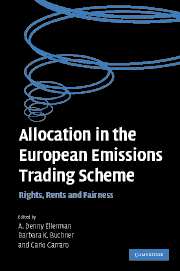Book contents
- Frontmatter
- Contents
- List of figures
- List of boxes
- List of tables
- List of contributors
- Introductory note/Foreword
- Acknowledgements
- Glossary and abbreviations
- Part I The EU ETS allocation process
- Part II Experiences from Member States in allocating allowances
- Part III Concluding remarks and background material
- Appendix I Participants
- Appendix II The individual country outlines
- Appendix III The country tables
- Appendix IV Background material from the European Commission
- Index
Introductory note/Foreword
Published online by Cambridge University Press: 22 September 2009
- Frontmatter
- Contents
- List of figures
- List of boxes
- List of tables
- List of contributors
- Introductory note/Foreword
- Acknowledgements
- Glossary and abbreviations
- Part I The EU ETS allocation process
- Part II Experiences from Member States in allocating allowances
- Part III Concluding remarks and background material
- Appendix I Participants
- Appendix II The individual country outlines
- Appendix III The country tables
- Appendix IV Background material from the European Commission
- Index
Summary
Environmental policy-making in Europe has undergone a profound change over the last two decades: new policies have been initiated primarily at the EU rather than Member State level, and the influence of economic thinking has become quite important. There is probably no other policy area where this shift is clearer than on climate change, and the development of the EU ETS is undoubtedly the most remarkable example of both developments.
It was indispensable for all those involved in the development of climate change policy to be able to rely on solid academic work in both Europe and the world at large. It is very welcome for me as a policy-maker that this work is not limited only to conceptual thinking, but also takes in the evaluation of practical choices made in mundane matters such as allocation. This book is therefore a timely contribution for all those involved in the design of further trading schemes around the world for the first Kyoto Protocol period 2008-2012 and beyond.
All observers realised that the learning-by-doing phase of the EU ETS in 2005 would be challenging from several perspectives. Perhaps the most important was the absence of a comprehensive database concerning the emissions of the 11,500 installations covered by the EU ETS. Many pragmatic solutions had to be invented on the spot by the national officials in the capitals and in the Commission's offices.
- Type
- Chapter
- Information
- Allocation in the European Emissions Trading SchemeRights, Rents and Fairness, pp. xvii - xviiiPublisher: Cambridge University PressPrint publication year: 2007



